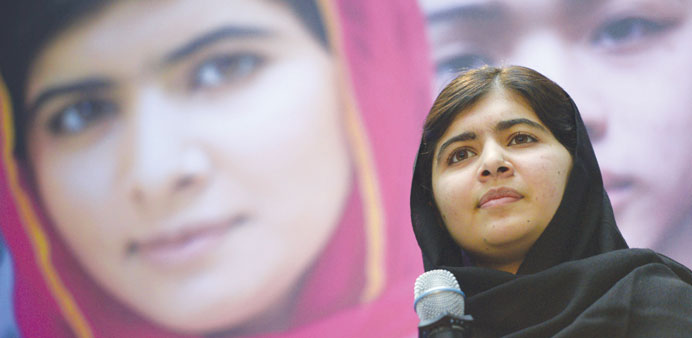|
The Nobel Peace committee has failed to read the legend of Malala Yousafzai for what it’s worth. While it would be well-nigh impossible to fully configure her potential, the nearest anyone came to immortalising her universal avatar was a banner in Nepal that read: “Every child’s sister, every parent’s daughter”. |
While this may be an emotional call even if well earned, what is not is her incredible courage, defiance against the forces of obscurantism and the unbreakable spirit to fight for the right of children when she herself appears to be a child.
The Friday shocker that saw the Nobel committee overlook her candidature for this year’s peace prize is hard to fathom. Although, to be sure, it is not the first time that an award has left the world agape.
The unexpected benevolence for President Barack Obama for what essentially was little more than a statement of good intent when he was still getting used to the Oval office trappings is but just one sampler.
The expectation around the globe was that Malala would become the youngest Nobel laureate at 16 - half the age of current record-holder Yemeni peace activist Tawakal Karman, who won the honour in 2011.
However, the Nobel committee plumped instead for the Organisation for Prohibition of Chemical Weapons (OPCW), currently involved in dismantling chemical stockpiles in Syria.
While the seriousness of OPCW’s efforts are not in doubt, they have been in the business long enough and only doing what is expected of them.
The fact is that a decision of this nature - working to eliminate chemical weapons - cannot proceed without active international support and necessarily, involving the highest leadership.
Technically speaking, submissions for nominations are closed by February 1 every year, and thereafter, the five-member Nobel committee can declare an out-of-the-box winner, but they are expected to have a solid reason for tearing the script.
However, the OPCW did not fall in the calendar, strictly speaking. The only candidate whose pitch reached a crescendo in the lead-up to the coveted prize was Malala Yousafzai.
Ever since miraculously waking up from the dead in Britain - thanks to a major reconstruction surgery and continuing therapies - she has been on the road, motivating the world to actively support the inalienable right of every child to education, especially girls.
Last winter while in Pakistan, I persuaded the then-federal education minister to push with President Asif Zardari for setting up a fund in Malala’s name for this purpose. We already had the support of Gordon Brown, the former British prime minister and UN Special Envoy on Education.
Within days, the idea germinated with President Zardari proceeding to Paris for a multilateral meeting under the UN aegis and announcing the seed money for the fund. Only the other day, the World Bank announced a $200mn donation for the fund.
Who - no prizes for guessing though - has made this possible? The Nobel should have gone to Malala not because her very strong candidacy fell in the calendar, but because sometimes the right pick is about timing, especially one whose idea has come.
One would have thought the Nobel committee would just seize the moment when it clearly knew she has been a game-changer - as has been proved over the course of a year or so in how Malala, belying her tender years, has led the global cause.
There has never been a more compelling 16-year-old, who the world listens to with such rapt attention.
She imbibes a universal message, driven by an awe inspiring mien. Pertinently, it comes from someone, who has literally taken a bullet to advance the cause. We’re talking of millions of children out of school here. A Nobel ticket would have acted as a catalyst to turbo charge the cause.
Unfortunately, the Nobel committee wasted a terrific opportunity given to them on a platter, so-to-speak.
It is not Malala’s loss - she is a young woman (perhaps, not a child in the sense it is being suggested by well-meaning commentariat), who will continue to fly high -but it is a setback for those out-of-school kids, who could have benefited enormously from the potential of a Nobel-prized campaign.
Much hype has been created over Malala’s age and ability to cope with the trappings of a Nobel. Frankly, she has already lost - or to be more contextual - put her childhood behind her.
She is not being given the credit that is her due in a lot of ways, and one of which is that she has strongly allayed concerns surrounding any vulnerability about age and the ability to cope with the resultant fame and responsibility that an honour like the Nobel could have fetched.
We have seen how she has been handling it all since waking up from the dead and trotting on the world stage like a “leader” possessed. The fact is she was already headed for greatness even if the Taliban murderers hadn’t come for her that fateful day when her legend assumed a new halo.
Regardless, Malala is unlikely to be any less determined to find her place in history as someone who changed the world definitively.
♦ The writer is features editor.

